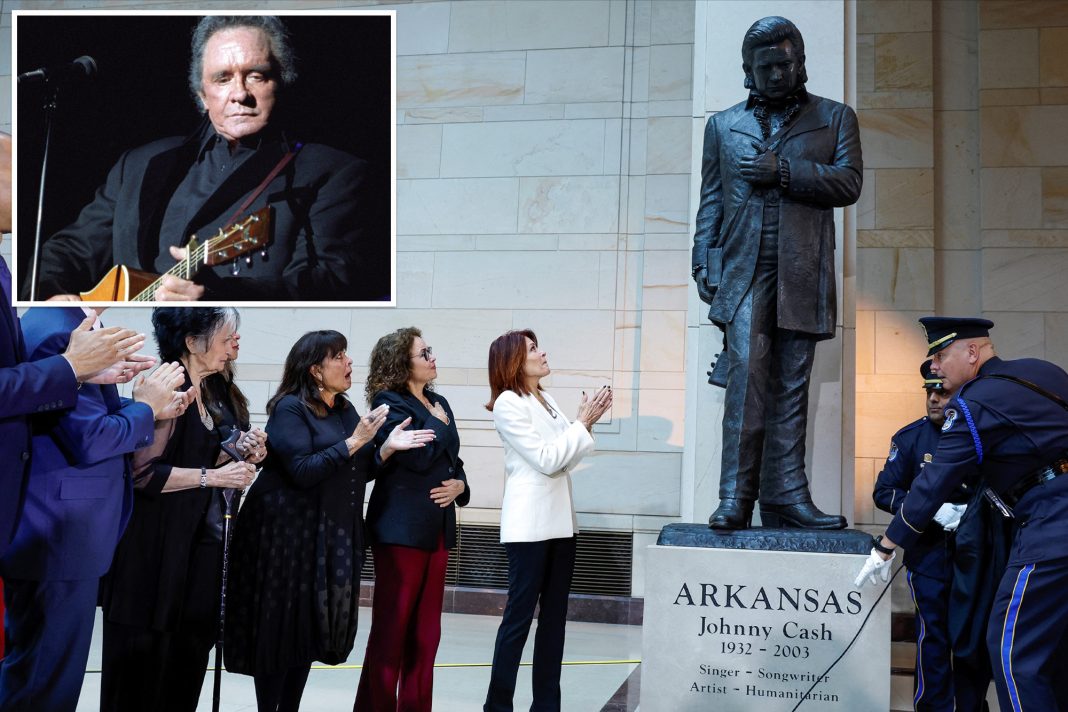Johnny Cash continues to resonate through the corridors of American history, an enduring symbol of resilience and artistry. Recently, a significant milestone was reached with the unveiling of a statue in his honor inside the U.S. Capitol—an unprecedented tribute to a musician in a space traditionally reserved for political figures. This moment not only celebrates Cash’s legacy but also prompts reflection on the broader role of music and culture in shaping American identity.
The decision to honor Johnny Cash came after Arkansas chose to replace its previous statues of Uriah Rose and Senator James Clarke, figures whose legacies were marred by their associations with Confederate sympathies and segregationist policies. This shift, emblematic of a changing societal perspective, signifies a recognition of artists who have influenced the cultural landscape. Earlier this year, a statue of civil rights leader Daisy Bates was also installed, further emphasizing the Capitol’s evolving narrative around representation and honor.
At the unveiling ceremony, attended by hundreds—including congressional leaders from both sides of the aisle and members of the Cash family—House Speaker Mike Johnson articulated the significance of this honor, stating, “Some may ask: Why should a musician have a statue here in the halls of the great American republic? The answer is pretty simple. It’s because America is about more than laws and politics.” This sentiment captures the essence of Cash’s contribution, illustrating how music transcends mere entertainment to become a unifying force in American society.
The statue itself, crafted by Little Rock sculptor Kevin Kresse, portrays Cash in a moment of reflection, guitar slung across his back and a Bible in hand—a nod to his deep Christian faith and the moral compass that guided much of his life. Rosanne Cash, his daughter, poignantly remarked that her father would have considered this honor the pinnacle of his life’s achievements. “This man was a living redemption story,” she reflected, highlighting how Cash’s tumultuous upbringing in a government agricultural resettlement community forged his character and work ethic.
Governor Sarah Huckabee Sanders shared a personal perspective, recalling how, during her childhood, Johnny Cash was revered in her home, second only to the values of faith and service to the nation. “When so much in today’s world is fake, Johnny Cash was very real,” she asserted, reinforcing the idea that authenticity is a rare and valued trait in both art and life.
Democratic leader Hakeem Jeffries, during his remarks, underscored Cash’s lasting inspiration across generations of artists. He amusingly quoted Bob Dylan and Snoop Dogg, the latter referring to Cash as a “real American gangster.” This blend of admiration across genres—from country to hip-hop—underscores the universal appeal and cultural significance of Cash’s music. As Jeffries concluded, “What a life, what a legend, what a legacy,” he encapsulated the sentiments of those gathered, celebrating not just Cash’s contributions to music, but his role as a storyteller of the American experience.
Johnny Cash’s journey, marked by both struggles and triumphs, resonates deeply in today’s world. After passing away in 2003 at the age of 71 due to complications from diabetes, Cash left behind a legacy enriched by 13 Grammy Awards, including a lifetime achievement award in 1999. His military service in the Korean War and his first album release shortly thereafter in 1957 are testaments to a life lived with purpose and passion.
As his statue graces the U.S. Capitol, it serves as a reminder that the arts, particularly music, play an essential role in the fabric of American life. Johnny Cash’s story is not just one of personal redemption; it represents a collective narrative of struggle, resilience, and the enduring power of expression that continues to inspire countless individuals across the globe.

